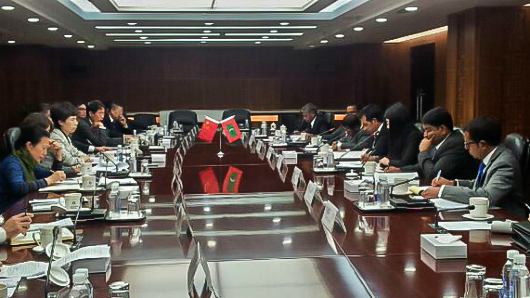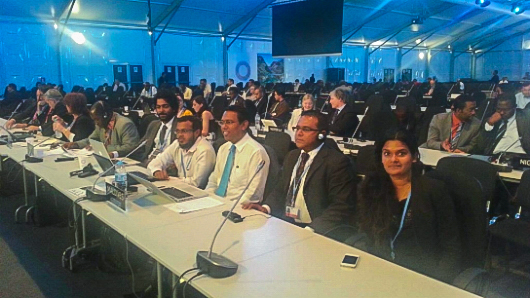In the mid-morning heat Latheefa Ahmed knelt thigh deep in the Kulhudhuffushi mangrove, head scarf muddy, long skirt tied beneath her buttocks as she buried coconut husks in a shallow muddy hole.
“This is the struggle we must put up for a few coins,” said the 58-year-old coir-rope weaver.
Latheefa usually leaves the coconut husks to soak in the mud for eight months. Once soft, the fibers are pounded, washed in salt water, dried in the sun, and hand woven into coir-rope or roanu, a product once famed for its strength and durability.
Roanu had been used in boat building, in the construction of homes and in the making of furniture. But now, it is mainly used as decoration in the country’s luxury resorts.
With the decline of the coir-rope industry and the move away from traditional ways of life, the majority of Kulhudhuffushi islanders see little use to the mangrove. The vast area is now used as a waste dump and islanders have proposed dredging the site for airport development or to give out plots of land.
The plight of the Kulhudhuffushi wetlands is indicative of lack of awareness of the essential eco services mangroves provide, from acting as habitats to birds and nurseries to fish, stabilising water tables, and enriching soil for agriculture, to protecting coast lines from tidal surges.
The neglect of mangrove ecosystems seems surprising as the Maldivian economy depends heavily on tourism, an industry that thrives on rich biodiversity.
Environmentalists have called for the introduction of new economic activities in mangroves such as preservation for local tourism or harvesting seafood on a commercial scale.
Asset or dump?
Executive Director of environmental NGO Bluepeace Ali Rilwan says mangroves are only second in biodiversity richness to coral reefs in the Maldives. Mangroves and wetlands act as carbon sinkholes, capturing twice the amount of carbon dioxide as other ecosystems, he said.
Lamenting the lack of research on Maldivian mangroves, Rilwan said atoll mangroves are different to those on the continental shelf as they exist in small patches on islands and boast a different variety of vegetation and wildlife.
Supporters of the ruling Progressive Party of the Maldives (PPM) have proposed the Kulhudhuffushi mangrove be filled in and developed into the airport promised by President Abdulla Yameen during the 2013 presidential elections.
Ali Hussein, a 50-year-old boat captain, said an airport was necessary to relieve high levels of unemployment on the island – the most populous in the North.
“There is no use to the mangrove. An airport will provide jobs. The only available jobs on the island right now are as cashiers at shops. At the Hanimadhoo airport, all the jobs go to people from Hanimaadhoo. They don’t hire graduates from Kulhudhuffishi,” he said.
Taxi driver Ahmed Nizar said Kulhudhuffushi islanders now pay MVR1500 (US$100) for a boat to Hanimadhoo, which is equivalent to a one-way air ticket from Hanimadhoo to Malé.
“When PPM asked us how can they get a majority in Kulhudhuffushi, we told them build us an airport. They agreed. Then I personally drew the pictures of the airport that you see on the walls of houses now,” he said proudly.
Those who oppose the venture — pointing out the airport 25 minutes away in Hanimaadhoo — propose the mangrove be filled in to give out plots of land for housing to ease population pressure.
No place for birds, turtles
However, for Kulhudhuffushi Councilor Mohamed Aiman, the mangrove is the “most important asset the island has”.
The council would not obstruct airport development on the island, Aiman said. But he believes the mangrove must be preserved for guesthouse tourism. Kulhudhuffushi lacks sandy beaches, and the mangrove is the only remaining site of untouched natural beauty, he said.
Local tourism would revive the coir-rope industry as well, Aiman said.
“When guests come to islands they would want to experience the culture and traditions of the island. This will have a positive effect on coir-rope making and haalu folhi [sweet crepe] production,” he said.
Bluepeace’s Rilwan blames the lack of awareness on the lack of research into mangroves, and said the biodiversity of mangroves must be documented for better conservation.
He has called for the introduction of new economic activities in mangroves such as the harvest of mud crabs to increase the economic value of the area.
Meanwhile, Director General at the Environmental Protection Authority, Ibrahim Naeem says Maldivians must reconsider their approach to development.
“Land is being reclaimed, mangroves filled in, reefs dynamited, for airports, for houses, for harbors without any thought to their environmental impacts. Large swathes of land have been reclaimed from the sea in several islands, but there is no demand for these lands. We have to consider what we are doing. We are destroying the very ecosystems tourism is dependent on,” he said.
“Islands and sandbanks are being leased out for economic activity. There are no sandbanks for the birds or the turtles. When we talk of sustaining tourism, we have to think about sustaining our biodiversity, protecting all of our living creatures.”
This article is part of an environmental journalism project supported by Banyan Tree Maldives.
Related to this story
Precious mangrove under threat as government plans airport in Kulhudhuffushi
Kulhudhuffushi airport unconstitutional and unfeasible, says Ecocare


